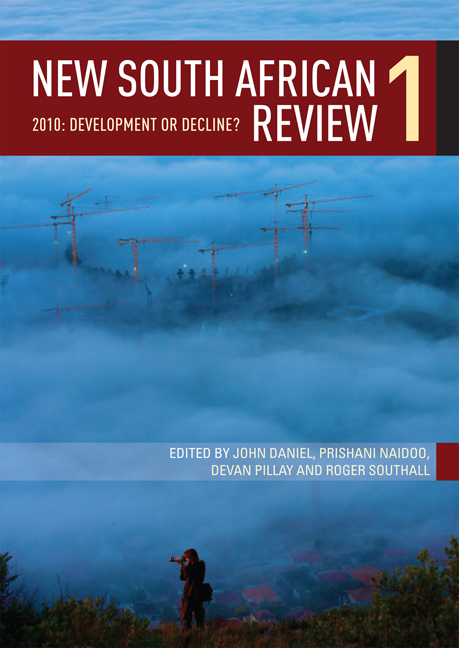Book contents
- Frontmatter
- Contents
- Preface
- Introduction South Africa 2010: From short-term success to long-term decline?
- PART 1 ECONOMY, ECOLOGY AND SUSTAINABILITY
- PART 2 STATE, POLITICS AND POLICY
- INTRODUCTION The politics and challenges of delivery
- CHAPTER 6 The African National Congress under Jacob Zuma
- CHAPTER 7 Indigent management: A strategic response to the struggles of the poor in post-apartheid South Africa
- CHAPTER 8 Fear, enervation and the systematisation of disorder: Challenges to reforming the Department of Home Affairs
- CHAPTER 9 The mobile nation: How migration continues to shape South Africa
- CHAPTER 10 South African female peacekeepers: An exploration of their experiences in the Democratic Republic of Congo
- PART 3 EDUCATION, HEALTH AND LAND
- PART 4 Doreen Atkinson
- Contributors
- Index
CHAPTER 10 - South African female peacekeepers: An exploration of their experiences in the Democratic Republic of Congo
from PART 2 - STATE, POLITICS AND POLICY
Published online by Cambridge University Press: 21 April 2018
- Frontmatter
- Contents
- Preface
- Introduction South Africa 2010: From short-term success to long-term decline?
- PART 1 ECONOMY, ECOLOGY AND SUSTAINABILITY
- PART 2 STATE, POLITICS AND POLICY
- INTRODUCTION The politics and challenges of delivery
- CHAPTER 6 The African National Congress under Jacob Zuma
- CHAPTER 7 Indigent management: A strategic response to the struggles of the poor in post-apartheid South Africa
- CHAPTER 8 Fear, enervation and the systematisation of disorder: Challenges to reforming the Department of Home Affairs
- CHAPTER 9 The mobile nation: How migration continues to shape South Africa
- CHAPTER 10 South African female peacekeepers: An exploration of their experiences in the Democratic Republic of Congo
- PART 3 EDUCATION, HEALTH AND LAND
- PART 4 Doreen Atkinson
- Contributors
- Index
Summary
MEN ARE THE MILITARY; WOMEN ARE <I>IN THE MILITARY1
For more than a decade South Africa has been an active participant in international peacekeeping. It is currently the thirteenth biggest troop-contributing country (TCC) to international peace missions, with the largest women's contingent deployed and one of only a handful of countries incorporating women into combat positions in its military.
In 2010, the international community will commemorate the tenth anniversary of UN Resolution 1325 – the women, gender, peace and security resolution – which commits the UN to the mainstreaming of gender in all its peace-related activities. Yet there remains, in the words of Olsson and Tryggestad (2001:3) a ‘gap in the knowledge concerning women and peacekeeping – as opposed to men and peacekeeping’ (see also Sion 2008). This chapter explores the experiences of a small number of South African female peacekeepers in the Democratic Republic of Congo (DRC), counter balanced by the perceptions of their male colleagues. The research data is supplemented by insights provided by senior decision makers and other experts involved in peacekeeping training, as well as by the comments and discussions of female soldiers involved in the 2007 SANDF Women's Day Conference (WD Conference) organised around the theme Empowering Women for Gender Equity. The purpose is to evaluate the extent to which gender is being incorporated into the training and experience of peacekeepe rs and to identify the challenges and policy options in this regard in order to contribute to a body of knowledge on best practice, not only for South Africa's involvement in peacekeeping missions, but also for other countries.
In the first section, gender and gender mainstreaming in international peacekeeping is discussed. The second section deals with the methodology applied in this study, as well as with constraints and limitations to it, while section three presents and discusses the research findings based on the themes identified in the first section. A number of recommendations are provided in the conclusion.
GENDER MAINSTREAMING IN INTERNATIONAL PEACE MISSIONS
Resolution 1325, adopted by the Security Council in October 2000, was an indication of the increasing importance at the time attached to the role and position of women in conflict, and in approaches to peacemaking, peacekeeping and peace-building.
- Type
- Chapter
- Information
- New South African Review2010: Development or Decline?, pp. 236 - 252Publisher: Wits University PressPrint publication year: 2010



